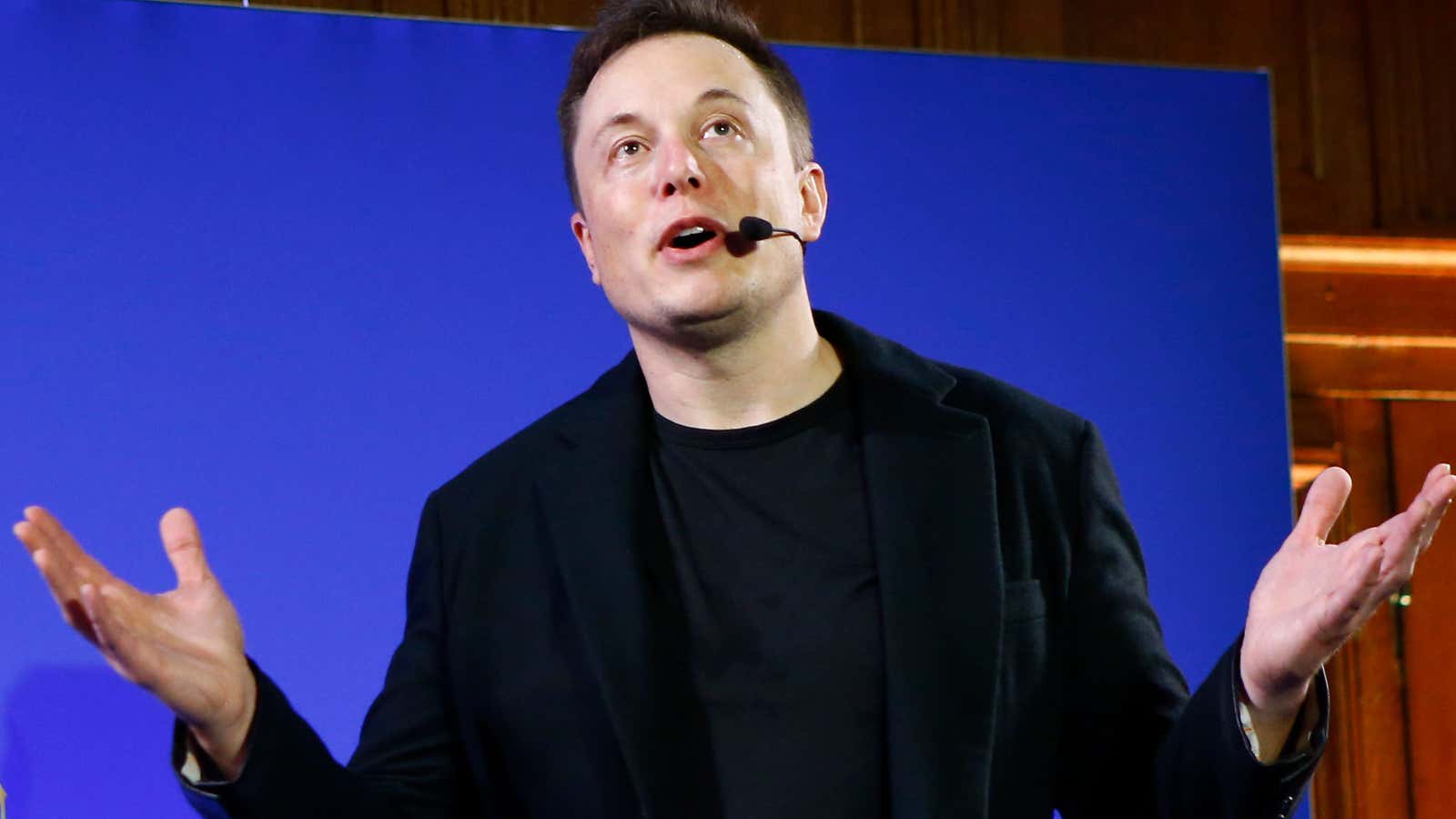Elon Musk and the ground don’t seem to meet very often, at least not in our portrayals of the billionaire tech inventor.
In illustrations meant to capture Musk in likeness and spirit, he is, for obvious reasons, typically riding a rocket, floating in space, or hovering above Mars. Even in images where the cofounder and leader of both SpaceX and electric car maker Tesla is not outside our orbit, his feet may be miraculously airborne. The message is that he’s not like the rest of us, and considering his achievements, we can’t debate that.
Except, as a new, tear-soaked interview with the New York Times makes evident, in some essential ways, Musk is actually a lot like an ordinary person.
For instance, he needs to sleep, and when he doesn’t, he courts trouble. Last week, he tweeted that he might like to bring Tesla private, surprising his own board, sending the stock price soaring, and reportedly triggering a subsequent investigation by regulatory authorities. Most forensic dissections of the tweet misstep now point to Musk’s erratic behavior as a result of sleep deficiency.
Musk told the Times that he works 120-hour weeks and admitted to catching what sleep he did on the factory floor, not even venturing outside for three or four days straight. “This has really come at the expense of seeing my kids. And seeing friends,” he said, before seemingly becoming too emotional to continue.
To varying degrees, these interconnected problems are riddles we’re all trying to solve. How do you sleep enough to avoid the hazards that can come with exhaustion, and without resorting to pills, as Musk does, which actually can trigger even more bizarre behavior? And how do we find time for meaningful relationships, and the lasting happiness they can bring, when our culture of work is all-consuming?
In Musk’s case, the vicious cycle created by not answering these questions—not caring for one’s personal and mental health—has been made public. It’s also traceable in Tesla’s falling share price and corporate reputation. In her assessment of Musk’s antics, tech journalist Kara Swisher concluded in a recent Times op-ed that Musk can salvage his status by demonstrating that Tesla “is not just revolving around his aura” and is run by “a team that does its best work with or without him.”
Last year, Yale management professor Jeffrey Sonnenfeld told Quartz at Work that this idea has become paramount in many Silicon Valley companies. We don’t need reassurances about tech’s promise or our spectacular future with it, he said. We’re already sold. What we need now, Sonnenfeld said, “is people to get us from here to there,” including tech leaders who can do the job without putting themselves at the center of the universe or being abusive to others, another mark against Musk.
To be sure, the “grounded” sensibility that investors seek is partly personality driven. But it also has to be intentional. Google CEO Sundar Pichai famously says he doesn’t even allow Google prototypes at home. Microsoft CEO Satya Nadella does a daily meditative exercise that involves literally feeling your feet on the ground. He says he also reads constantly to maintain some perspective. Facebook COO Sheryl Sandberg espouses the value of paid leave for illness, parenting, or grief, and has bought into Arianna Huffington’s sleep-hygiene agenda.
According to sources not named in the Times, Sandberg has been courted by Tesla to come in as COO, in a search characterized as years long and fruitless—which makes for another argument about the value of staying well. You’ll be more likely to attract talent when your company culture seems sane, as a baseline.
Can Musk do it? In the interview, he walks a line between what the Times called “an extraordinary level of self-reflection and vulnerability” and what looks like denial to the outside eye. Asked if he’ll quit Twitter, he says, “Why would I?”
Of course, he already has shown why he ought to not only quit Twitter but reconsider his entire approach to managing stress. “It’s not been great, actually,” he says. “I’ve had friends come by who are really concerned.”
The people who keep up with Musk well enough to be counted as friends are probably pretty shrewd. He ought to hear them out.
A version of this essay appeared in the weekend edition of the Quartz Daily Brief. Sign up here for the newsletter, tailored for morning delivery in Asia, Europe and Africa, or the Americas.
